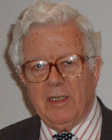China's Evolving Legal System and Increasing Role in Foreign Affairs
Geoffrey Howe, the Lord of Aberavon CH QC (Former British Deputy Prime Minister and Foreign Minister)
J. Sean Curtin (GLOCOM, Fellow and Asia Times)
In this article Geoffrey Howe reflects on the evolutionary process taking place in the Chinese legal system. He believes the demand for an equitable justice system is gradually pushing China towards becoming a more democratic society.
 Lord Howe also highlights the re-emergence of China on the diplomatic stage after decades of near isolation. He personally sees this as one of the most significant developments in global foreign affairs during his time in office. Lord Howe also highlights the re-emergence of China on the diplomatic stage after decades of near isolation. He personally sees this as one of the most significant developments in global foreign affairs during his time in office.
Geoffrey Howe, the Lord of Aberavon CH QC:
China's Evolving Legal System
There is a recognition that as the [Chinese] legal system changes, there is a huge transformation taking place. There is a recognition in China of the need for the legal system to be closer to the people, to be understood by the people, to be responding to the people.
One sees President Hu [Jintao] and Prime Minister Wen [Jiabao] go out amongst the people in a way the older generation of Chinese leaders never did. By recognizing that if the law has got to be in-tune with people then it needs to be built on a foundation of democracy. There a process of democratization is taking place, albeit concentrated in the grass roots.
There are, of course, still features which cause outsiders uneasiness about the present structure of Chinese society. The extent to which the rule of law was at one time regarded as solely the instrument of the state, designed solely to maintain the position of the Communist Party, has given way now to a much more liberal view. That is the way I predict that it is going to go.
We see the scale of the Chinese reformation at the Great Britain-China centre. Each year it takes part in a two-way training programme, receiving Chinese judges here, reciprocal training, conducting legal seminars in Beijing with Chinese lawyers taking part, giving similar insights to the organization of social programmes on the prospects of rising unemployment and so on.
China's increasing role in foreign affairs
The other feature I think one has to notice, and it is perhaps more important, is the increasing role being taken by China in the field of foreign affairs. China was for sometime very semi-detached in a kind of political external wall.
I was lucky enough to be representing Britain at the United Nations, when in 1988 we had the first meeting of the foreign ministers of the five permanent members [of the security council] together for some twenty years. I am proud to say that this was due to an initiative of the British Ambassador of the time.
I remember meeting my Chinese opposite number Wu Xueqian and Mr. [Eduard] Shevardnadze, the lamented former foreign minister of the Soviet Union. I was thinking that China was once again reemerging for a global role in that circuit.
Now she is working strongly in the World Trade Organization, and an active participant in organizations around the Pacific Rim, building an economic as well as political relationship with India and playing a leading role in the six prior meetings that have taken place to handle the problem of the development of nuclear weapons in North Korea. In all these ways, it is a huge pleasure and privilege for our generation to see this re-emergence of a country with China's enormous cultural experience.
I am not more starry-eyed about China than I am about any other country. We learnt the hard way in some respects during our time in government [1979 to 1997]. We thought we had done so well in restoring the British economy that we had learnt to walk upon the water. Even China has not learnt how to do that yet. It will take some time for her to manage it. It seems having put a man in space nothing is beyond her.
President [George W.] Bush said he did not think the French had a word for entrepreneur, but the Chinese don't need a word for entrepreneur, because they are all entrepreneurs.
The above comments were made at a China Connect Event at PricewaterhouseCoopers Embankment offices in London on 16 March 2004.
Profile: Rt Hon Geoffrey Howe, the Lord of Aberavon CH QC
Lord Howe served as a Cabinet Minister for nearly the entire period of Margaret Thatcher's Government. For four years (1979-83) as Chancellor of the Exchequer, six years (1983-89) as Secretary of State for Foreign and Commonwealth Affairs and, finally, as Deputy Prime Minister and Leader of the House of Commons (1989-9O). He retired from the House of Commons in the 1992 General Election and was awarded a Life Peerage, entering the House of Lords in July 1992. He is currently President of the Great Britain-China Centre.
Related Articles
The Dragon invests in China
J. Sean Curtin, Asia Times, 17 August 2004
A Quarter Century of Improving Sino-British Relations
Europe Report #100, 10 August 2004
A Quarter Century of Improving Sino-British Relations
Europe Report #99, 6 August 2004
| 




